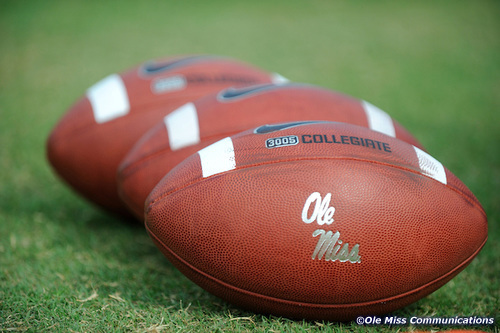Headlines
Ritter: Student-Scholar-Serving-Athlete
Plenty of people will look at a college football player and assume that they are just here to playfootball because they “Ain’t come to play school.” But that’s not necessarily the case- sure, the athlete may have been recruited here for the athletic program in which participate. Sure, they represent our university on the field while wearing the Red and Blue- the representation doesn’t stop there, though. Student athletes are exactly what it sounds like they are: a student and an athlete.
Keep in mind that while these men and women play for their school, they also learn from their school as well. You see them in classes, in the Union, and in the Grove- they are a student just as everyone else is. By this standard, they should be treated in the same manner other students are, with minor accommodations made to count for the countless hours they spend on their sport.
The issue that comes with being a student athlete is the matter of balancing time commitments. In addition to all of the things non-athletes do with regards to classes, work, and a social life, athletes obviously also need to put in countless hours of work practicing and learning how to perform in their given sport. For this reason, there are some students that may suggest athletes get an “easy break” with classes or that the university “helps them out” so they can stay on the field. This is the real gripe that students have with regards to student-athletes: do they really just coast by due to their status while the rest of the students have to work hard for their grades?
The answer has been a subject of debate for a while now. Since athletes are performing a “job,” so to speak, while attending school, the amount of time they put into that then takes away time available for doing other work- specifically homework. Anybody who is working while in college can attest to this fact. The difference is that in addition to supporting themselves with the earned money (in the form of tuition), they also need to support the school by representing their needs.
In seeing this conflict, many student athletes will willingly sacrifice time on schoolwork in exchange for time in the practice facilities. In doing what they feel is right for their school and satisfying a personal desire to play, they jeopardize their chances at performing in the classroom. That’s why many institutions with large athletic departments make tutors readily available (and in some cases mandatory) for the athletes to keep up their grades. By doing this, the administrators are making sure that athletes have to follow similar protocol that the students who aren’t playing are required to follow.
The only difference is that these student athletes have more resources available to them. This is in part due to the fact that the scheduling conflicts of a full season of sports can cause devastation to an academic work schedule that isn’t properly evaluated and arranged. When student athletes are forced to miss classes for athletic reasons, they should have some way to make that up, with the easiest method being tutoring. Many students who are not familiar with the amount of effort and time required by college athletes may see these types of benefits as unfair. This is just simply not the case- tutors are available to every student on campus for any class. In addition, given the amount of time these student athletes put into their representation of the school through their respective sports, we should be willing to make resources available so they can receive the education that non student athletes receive.
In addition to the student athletes’ representation of their school on the field and in the classroom, many sports teams engage in some sort of community engagement. During the playoffs and postseason, teams will usually travel to a nearby children’s hospital or something of the sort to engage young fans. It is good publicity for the team and it’s beneficial for them to experience time together in a non-competitive environment.
This sort of community service allows many people outside of the athletics sector of schools to see that these kids aren’t just benefiting their school by bringing in money from athletic events. The fact that the student athletes have to do community service isn’t very different from the rest of the community, where students do community service as well. These are in fact young men and women just like the rest of the people going through college. They aren’t really all that different from non student athletes, except they represent the school in a more public light than the majority of students would. That does not mean that students don’t do community service or that they aren’t publicized for doing so. It just means that people outside of the school tend to follow athletes more closely than a student. A commitment to community service by college sports teams humanizes student athletes so they can be more relatable for the fans and media. The service also offers student athletes the opportunity to deepen their college experience amidst their busy schedules.
In doing all of these things, student athletes are basically a public personification of the school and what it hopes to do. On the field, student athletes tend to be more athletes than students, standing in a whole league of their own. Their performance on the team is a school’s way of competing for bragging rights amongst other competitive schools (and Mississippi State). This is what is asked of a student athlete when they agree to play for a team at a university. When off the field, these student athletes are student scholars. They balance their other commitments with the schoolwork just like everybody else does. The use of tutors helps to circumvent the issues created by a hectic schedule. They are working hard to keep up their GPA and hoping to make a career out of their work in case the sports don’t fare so well professionally. Lastly, these people realize that they have been given gifts that most people don’t have, both in terms of talent and opportunity. By sharing with the community and giving back to those that may not be in as opportune positions, they can change the way that others perceive them individually, the team as a whole, and the university which they represent. It is important to remember that while some of these student-athletes can be idolized around big campuses, they are really no more a student of that school than anybody else. Anybody who attends a school like the University of Mississippi is an ambassador, representing the ideals and morals of the school, regardless of who they are.
 Dylan Ritter is a Chemistry and Biochemistry major at the University of Mississippi. He is a passionate fan of Ole Miss athletics, but plans to pursue a career in the sciences. He works in a genetics lab during the summers where he hopes to uncover the secrets behind Autism Spectrum Disorder.
Dylan Ritter is a Chemistry and Biochemistry major at the University of Mississippi. He is a passionate fan of Ole Miss athletics, but plans to pursue a career in the sciences. He works in a genetics lab during the summers where he hopes to uncover the secrets behind Autism Spectrum Disorder.
Story and Photo Courtesy Populi Magazine






























